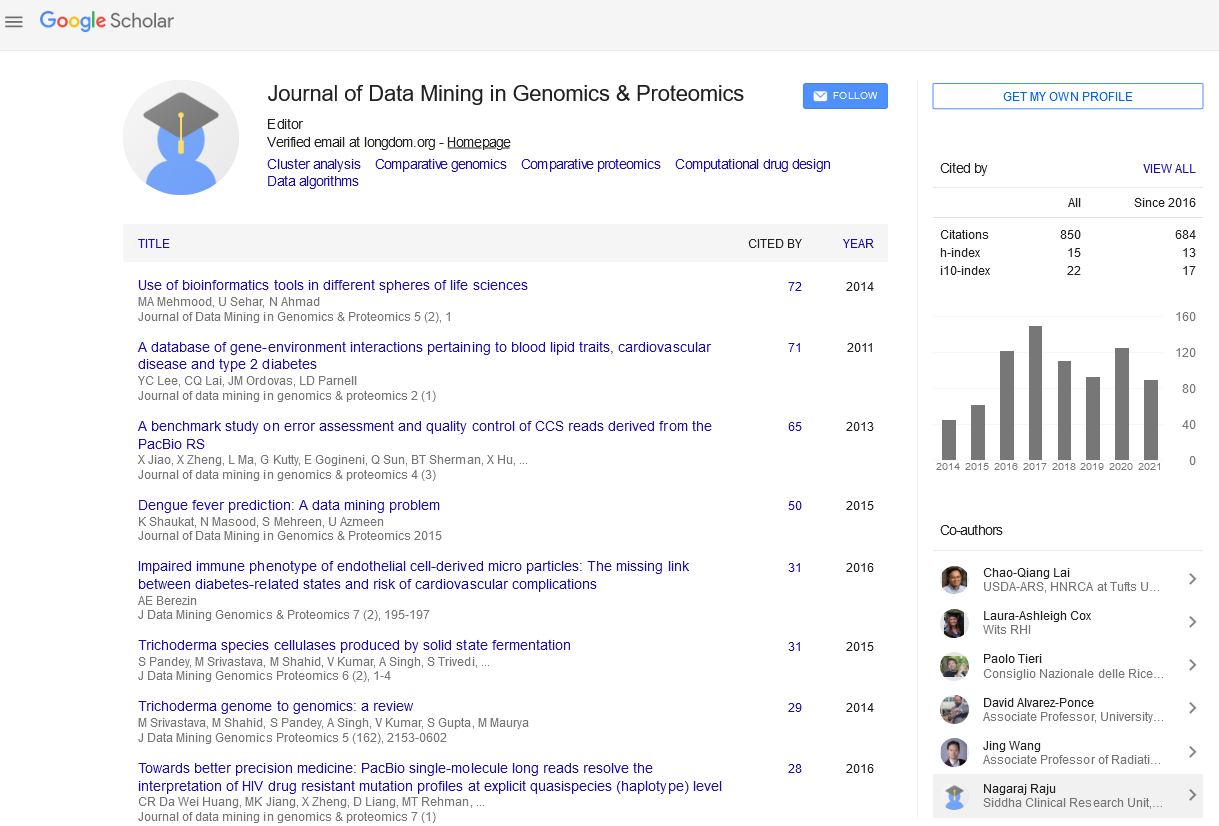PMC/PubMed Indexed Articles
Indexed In
- Academic Journals Database
- Open J Gate
- Genamics JournalSeek
- JournalTOCs
- ResearchBible
- Ulrich's Periodicals Directory
- Electronic Journals Library
- RefSeek
- Hamdard University
- EBSCO A-Z
- OCLC- WorldCat
- Scholarsteer
- SWB online catalog
- Virtual Library of Biology (vifabio)
- Publons
- MIAR
- Geneva Foundation for Medical Education and Research
- Euro Pub
- Google Scholar
Useful Links
Share This Page
Journal Flyer

Open Access Journals
- Agri and Aquaculture
- Biochemistry
- Bioinformatics & Systems Biology
- Business & Management
- Chemistry
- Clinical Sciences
- Engineering
- Food & Nutrition
- General Science
- Genetics & Molecular Biology
- Immunology & Microbiology
- Medical Sciences
- Neuroscience & Psychology
- Nursing & Health Care
- Pharmaceutical Sciences
Investigating mechanisms of genome maintenance through protein and chromatin interactions
2nd International Conference on Big Data Analysis and Data Mining
November 30-December 01, 2015 San Antonio, USA
Sudha Sharma
Howard University, USA
Posters-Accepted Abstracts: J Data Mining Genomics Proteomics
Abstract:
In humans, RECQ1 is the most abundant of the five helicases (RECQ1, BLM, WRN, RECQL4, and RECQ5β) belonging to the RecQ family associated with rare genetic diseases of premature aging and cancer predisposition. Our earlier work has revealed a unique requirement of RECQ1 for genome stability maintenance. However, the mechanisms by which RECQ1 executes its functions in genome maintenance have remained largely elusive. My lab is utilizing an unbiased proteomic approach to identify novel protein interactions of RECQ1. We have discovered a direct interaction of RECQ1 with PARP-1 and characterized its functional implications in cellular response to oxidative stress. Moreover, we have identified that RECQ1 physically interacts and modulates the activity of Ku70/80 proteins which are part of DNA-PK complex for the repair of DNA double strand breaks. PARP-1 and DNA-PK are molecular targets for anti-cancer. Our results demonstrating RECQ1�??s ability to modulate the activities of PARP-1 and Ku70/80 of DNA-PK complex suggest chemotherapeutic potential of RECQ1. RECQ1 is uniquely important for the proliferation of cancer cells. We have used quantitative chromatin immune-precipitation to show that replication stress induces specific enrichment of RECQ1 at common fragile sites FRA3B and FRA16D where replication forks have stalled following aphidicolin treatment. Fragile loci are fork stalling sites that occur naturally in genome and often coincide with chromosomal breakpoints in tumors. Current efforts are directed towards identifying what functional sub-modules of repair machinery are associated with RECQ1 at specific genomic loci and how it participates in dynamic response to challenges under genotoxic stress.
Biography :
Sudha Sharma received her Ph.D. in Biochemistry from Banaras Hindu University, India and served for a brief period as Assistant Professor at the Hyderabad Central University, India. She received her Postdoctoral training under the guidance of Dr. Robert M. Brosh at National Institute on Aging, NIH; and Dr. Bruce Yankner at Harvard Medical School. She has a broad interest in the field of DNA repair and its implications in cancer and aging; and specific background in RecQ helicases. She has served on the review panel for agencies including National Science Foundation and her research is funded by the NIH/NIGMS.


